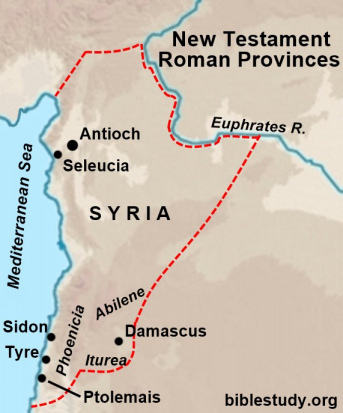Now those who had been scattered by the persecution that arose concerning Stephen went through Phoenicia and Cyprus and Antioch (in Syria), speaking the word to no one except Jews only (Acts 11:19, HBFV, see also 15:3 and 21:2).
Cities within provincial Syria included Damascus (Acts 9:2 - 3, etc.), Ptolemais (Acts 21:7), Seleucia (Acts 13:4), Sidon (Matthew 11:21 - 22, etc.), Antioch (Acts 6:5, 11:19 - 20, etc.) and Tyre (Matthew 11:21 - 22, etc.). Antioch, the capital city of the province, was one of the earliest locations where Christianity rapidly spread after the death of Jesus.
The Phoenician Region
The Phoenicians, living on the coast of ancient Syria, were known for their fabrics of wool, silk, cotton and linen. They were also considered the most skilled seamen of the ancient world.

"That the Phoenicians took to the sea at a very early date and became the most skillful mariners of the ancient world is certain . . .
"They exhibited a boldness and audacity in braving the perils of the sea in their little ships, which, for the age, demands our admiration. They were the first who dared to push out of sight of land in their voyages and sail beyond the Pillars of Hercules into the ocean" (International Standard Bible Encyclopedia, section on Phoenicia).
It was the Phoenicians of Syria who produced a script that became the forerunner of the Greek, Latin, Arabic, Hebrew and other alphabets.
"Their written characters were the same as the Samaritan or Old Hebrew; and from them the Greek alphabet, and through it most of the alphabets of Europe, were undoubtedly derived; hence they were regarded by the Greeks as the inventors of letters.
"Other inventions in the sciences and arts are ascribed to them, such as arithmetic, astronomy, navigation, the manufacture of glass, and the coining of money" (A New Classical Dictionary of Greek and Roman Biography, Mythology and Geography by William Smith, section on Phoenice).
Difficult but Beneficial
Existing far from Italy, Syria proved to be a challenging area for the ancient Romans to govern. It spite of its governance difficulties, however, the province proved beneficial to the Empire.
"As the eastern province of the Roman empire, and with its great desert frontier, Syria was constantly exposed to the irruptions of the Parthians, and, after them, of the Persians; but it long remained one of the most flourishing of the provinces" (ibid., section on Syria).